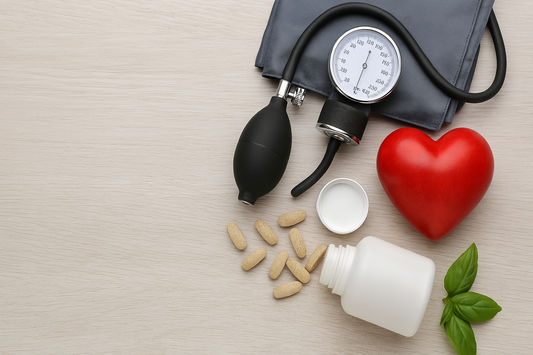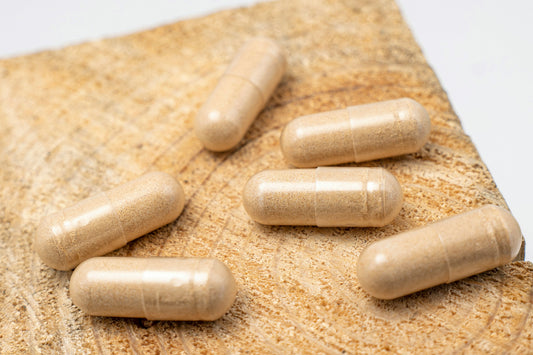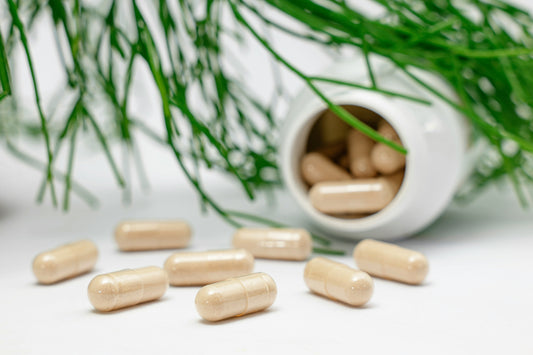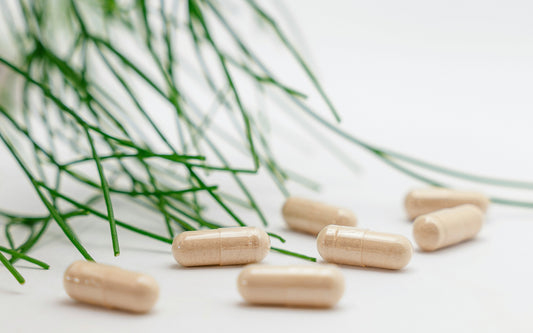What Tea Lowers Blood Pressure Fast
Looking for a natural solution to lower your blood pressure fast? Tea could be the answer you've been searching for. Not only is tea a delicious and comforting beverage, but certain types of tea have been found to have positive effects on blood pressure and heart health.
- Green tea can improve blood flow and reduce inflammation in the heart due to its antioxidant content.
- Hibiscus tea has been found to have positive effects on blood pressure and promotes heart health.
- Oolong tea, a combination of black and green tea, is rich in antioxidants and beneficial for heart health.
- Consult a doctor before adding tea to your diet, especially if you are taking medication.
- Other ways to manage blood pressure include maintaining a healthy weight, quitting smoking, eating a nutritious diet, exercising regularly, and limiting alcohol and caffeine intake.
The Benefits of Green Tea for Blood Pressure
Green tea is not only a refreshing beverage but also a powerful ally in lowering blood pressure naturally. Its antioxidant content helps improve blood flow, reduce inflammation in the heart tissues, and promote cardiovascular health. Regular consumption of green tea has been associated with a reduced risk of developing high blood pressure and can even aid in managing existing hypertension.
In addition to its antioxidant properties, green tea contains compounds called catechins that have been found to have a positive impact on blood pressure. These catechins help relax blood vessels, allowing for better blood flow and lower blood pressure levels. By including green tea in your daily routine, you can enjoy its numerous health benefits while actively working towards maintaining a healthy blood pressure.
To incorporate green tea into your diet, consider replacing your regular tea or coffee with a cup of green tea. You can enjoy it hot or iced, and you may even experiment with adding natural sweeteners like honey or lemon for added flavor. However, it's important to note that while green tea can be beneficial for blood pressure management, it is always best to consult with a healthcare professional if you have any underlying health conditions or are taking medication.
| Benefits of Green Tea for Blood Pressure |
|---|
| Improves blood flow |
| Reduces inflammation in the heart tissues |
| Promotes cardiovascular health |
| Relaxes blood vessels |
| Helps lower blood pressure levels |
Hibiscus Tea and Its Effects on Blood Pressure
Hibiscus tea, with its vibrant color and floral flavor, has been shown to have remarkable effects on blood pressure levels. This herbal tea is rich in antioxidants known as anthocyanins, which have been found to help lower high blood pressure. Studies have indicated that regularly consuming hibiscus tea can lead to a significant reduction in both systolic and diastolic blood pressure.
In one study, participants who drank hibiscus tea three times a day for six weeks experienced an average decrease of 7.2% in their blood pressure levels. Another study found that hibiscus tea was as effective as a commonly prescribed blood pressure medication in lowering blood pressure. The natural compounds present in hibiscus tea are believed to relax blood vessels, thus facilitating better blood flow and contributing to overall cardiovascular health.
To incorporate hibiscus tea into your routine, simply steep dried hibiscus flowers or tea bags in hot water for about 5-10 minutes. You can enjoy it hot or cold, depending on your preference. Consider adding a touch of honey or lemon for extra flavor. However, it is important to note that while hibiscus tea is generally safe for consumption, it may interact with certain medications, including antihypertensive drugs. Therefore, it is advisable to consult with a healthcare professional before adding hibiscus tea to your diet if you are already on medication.
| Benefits of Hibiscus Tea for Blood Pressure | How to Prepare Hibiscus Tea |
|---|---|
|
|
Oolong Tea: A Combination of Powerhouse Teas
Oolong tea, with its unique blend of dark and green tea flavors, offers a harmonious mix of benefits for blood pressure management. This traditional Chinese tea is not only a delight for the taste buds, but it also contains powerful antioxidants and beneficial compounds that can help lower blood pressure.
The antioxidant properties of oolong tea make it a valuable addition to any herbal remedies for hypertension. These antioxidants help protect the cells from damage caused by harmful free radicals, reducing inflammation and promoting heart health. By improving blood flow and relaxing blood vessels, oolong tea can effectively lower blood pressure levels.
In addition to its antioxidant content, oolong tea contains catechins, the same compounds found in green tea. Catechins have been studied for their potential in reducing blood pressure and improving cardiovascular health. By incorporating oolong tea into your daily routine, you can harness the combined benefits of black and green tea to support your blood pressure management goals.
| Benefits of Oolong Tea for Blood Pressure Management |
|---|
| 1. Antioxidant-rich properties protect against cell damage and reduce inflammation |
| 2. Improves blood flow and promotes heart health |
| 3. Contains catechins that help lower blood pressure levels |
| 4. Offers a unique blend of dark and green tea flavors |
It is important to note that while oolong tea can be beneficial for blood pressure management, it is essential to consult with a healthcare professional before adding it to your diet, especially if you are currently taking medication. Your doctor can provide personalized advice and ensure that it complements your existing treatment plan.
Consult a Doctor Before Adding Tea to Your Diet
While tea can be a natural and effective way to lower blood pressure, it is crucial to seek medical advice before making any significant changes to your diet. Consulting a doctor or healthcare professional is especially important if you are currently taking medication for hypertension. They can provide personalized guidance and ensure that incorporating tea into your daily routine aligns with your specific health needs.
Tea, particularly herbal remedies like green tea, hibiscus tea, and oolong tea, has been recognized for its potential in reducing blood pressure. Green tea, for example, contains antioxidants that improve blood flow and reduce inflammation in the heart tissues. It has also shown promise in promoting cardiovascular health. Hibiscus tea, on the other hand, has been found to have positive effects on blood pressure, with studies suggesting that it can help lower both systolic and diastolic blood pressure levels. Oolong tea, a combination of black and green tea, is rich in antioxidants and is known for its potential benefits in improving heart health.
However, it is important to note that tea should not be used as a substitute for prescribed medication or professional medical advice. Your doctor will consider your overall health, medication regimen, and individual circumstances to determine whether tea is a safe and appropriate addition to your diet. They may also recommend specific types of tea or suggest alternative approaches to managing your blood pressure.
While waiting for your doctor's advice, there are other natural ways you can actively manage your blood pressure. These include maintaining a healthy weight, quitting smoking, following a nutritious diet that is low in sodium and high in fruits, vegetables, and whole grains, engaging in regular physical activity, and limiting alcohol and caffeine intake. Adopting a holistic approach to managing your blood pressure can have a positive impact on your overall health and well-being.
Remember, tea can be a valuable addition to your efforts in achieving healthy blood pressure levels, but it is always best to consult with a healthcare professional before making any significant changes to your diet or treatment plan. By working together with your doctor, you can develop a comprehensive strategy that combines the benefits of tea with other lifestyle modifications for optimal blood pressure management.
| Herbal Tea | Key Benefits |
|---|---|
| Green Tea | Improves blood flow, reduces inflammation, promotes heart health |
| Hibiscus Tea | Helps lower blood pressure, supports cardiovascular health |
| Oolong Tea | Combines the benefits of black and green tea, contributes to heart health |
Other Natural Ways to Manage Blood Pressure
In addition to incorporating tea into your routine, several lifestyle modifications can play a vital role in effectively managing blood pressure. These changes, when combined with the consumption of green tea, hibiscus tea, or oolong tea, can create a holistic approach to maintaining healthy blood pressure levels.
One key aspect is maintaining a healthy weight. Being overweight or obese can put extra strain on the heart and contribute to high blood pressure. By adopting a balanced diet and engaging in regular physical activity, you can shed excess pounds and reduce the risk of hypertension.
Quitting smoking is another important step in managing blood pressure naturally. Smoking damages blood vessels and increases the likelihood of high blood pressure. By quitting smoking, you can improve your overall cardiovascular health and reduce the risk of developing hypertension.
A nutritious diet, rich in fruits, vegetables, whole grains, and lean proteins, can also have a positive impact on blood pressure levels. These foods are naturally low in sodium, which is known to increase blood pressure. Additionally, foods high in potassium, such as bananas and spinach, can help counteract the effects of sodium and promote healthy blood pressure.
Regular exercise is crucial for maintaining optimal blood pressure. Engaging in aerobic activities like walking, jogging, or swimming can help strengthen the heart, improve blood flow, and reduce the risk of hypertension. Aim for at least 150 minutes of moderate-intensity exercise per week.
Lastly, it is important to limit alcohol and caffeine consumption. Excessive alcohol intake can raise blood pressure, while caffeine can temporarily spike it. By moderating your intake of these substances, you can support healthy blood pressure levels.
By implementing these lifestyle changes alongside the consumption of tea, you can take proactive steps towards managing your blood pressure naturally. However, it is essential to consult with a healthcare professional before making any significant modifications to your diet or exercise routine, especially if you are taking medication for hypertension or other conditions.
The Role of Antioxidants in Blood Pressure Management
Antioxidants found in tea can have profound effects on blood pressure levels and overall heart health. Green tea, hibiscus tea, and oolong tea are popular choices that offer these beneficial antioxidants. Green tea, in particular, contains catechins that help improve blood flow and reduce inflammation in the heart tissues. This, in turn, contributes to the reduction of blood pressure and supports cardiovascular health.
Hibiscus tea, known for its vibrant color and refreshing taste, has been found to have positive effects on blood pressure. Research suggests that consuming hibiscus tea regularly can lead to a significant decrease in systolic and diastolic blood pressure. It works by relaxing blood vessels, which helps to lower blood pressure levels. Incorporating hibiscus tea into your daily routine can be a simple yet effective way to support heart health.
Oolong tea, a combination of dark and green tea, is another great option for those looking to manage their blood pressure naturally. This unique blend of teas offers a wide range of antioxidants, including catechins, theaflavins, and thearubigins. These antioxidants help improve blood flow, reduce inflammation, and support overall heart health. Adding oolong tea to your diet may contribute to a healthier cardiovascular system and a lower risk of hypertension.
| Tea | Antioxidant Content | Benefits for Blood Pressure |
|---|---|---|
| Green Tea | Rich in catechins | Improves blood flow, reduces inflammation |
| Hibiscus Tea | Contains anthocyanins | Relaxes blood vessels, lowers blood pressure |
| Oolong Tea | Combination of catechins, theaflavins, and thearubigins | Improves blood flow, reduces inflammation |
While tea can be a beneficial addition to a blood pressure management routine, it's important to consult with your doctor before making any significant changes to your diet or lifestyle, especially if you are taking medication to manage your blood pressure. They can provide personalized guidance and ensure that incorporating tea into your daily routine aligns with your specific health needs.
In addition to tea, there are other natural ways to manage blood pressure. Maintaining a healthy weight, quitting smoking, adopting a nutritious diet, engaging in regular physical activity, and limiting alcohol and caffeine intake are all lifestyle changes that can support optimal blood pressure levels and overall heart health.
| Natural Ways to Manage Blood Pressure |
|---|
| Maintain a healthy weight |
| Quit smoking |
| Adopt a nutritious diet |
| Engage in regular physical activity |
| Limit alcohol and caffeine intake |
In conclusion, tea, particularly green tea, hibiscus tea, and oolong tea, can be valuable allies in managing blood pressure due to their antioxidant content. These teas offer a natural and enjoyable way to support heart health and promote healthy blood pressure levels. However, it is essential to consult with a healthcare professional before incorporating tea into your blood pressure management routine. By making informed choices and combining tea consumption with other lifestyle changes, you can take proactive steps towards better cardiovascular health.
Understanding Hypertension and Its Impact on Health
Hypertension, or high blood pressure, is a prevalent condition that requires effective management to prevent further health complications. It is characterized by consistently elevated blood pressure levels, putting strain on the heart and blood vessels. If left untreated, hypertension can lead to serious health problems such as heart disease, stroke, and kidney damage.
One natural remedy that has gained attention in managing hypertension is tea. Green tea, hibiscus tea, and oolong tea have been found to have positive effects on blood pressure and cardiovascular health. Green tea, rich in antioxidants, improves blood flow and reduces inflammation in the heart tissues. Hibiscus tea, known for its floral flavor, has been linked to reduced blood pressure. Oolong tea, a combination of black and green tea, offers a powerhouse of antioxidants that contribute to heart health and lower blood pressure.
Before incorporating these teas into your diet, it is crucial to consult with a healthcare professional, especially if you are taking medication. They can provide guidance on the appropriate dosage and ensure that tea consumption does not interfere with the effectiveness of prescribed treatments. Additionally, it is important to note that while tea can be a beneficial addition to a blood pressure management routine, it should not replace medical advice or prescribed medications.
- Hypertension is a prevalent condition that requires effective management to prevent health complications.
- Tea, such as green tea, hibiscus tea, and oolong tea, has been found to have positive effects on blood pressure and heart health.
- Consulting a healthcare professional is important before incorporating tea into your diet, especially if you are taking medication.
- Tea can be a beneficial addition to a blood pressure management routine, but should not replace medical advice or prescribed medications.
| Tea | Benefits |
|---|---|
| Green Tea | Improves blood flow, reduces inflammation, and promotes heart health. |
| Hibiscus Tea | Reduces blood pressure and has positive effects on cardiovascular health. |
| Oolong Tea | Combines the benefits of black and green tea, rich in antioxidants and beneficial for heart health. |
Incorporating Tea into Your Daily Routine
Discover how to make tea an enjoyable and regular part of your daily routine to achieve the maximum benefits for lowering blood pressure. Herbal tea for hypertension has long been recognized for its positive impact on cardiovascular health. By following a few simple tips, you can easily incorporate tea into your daily life and reap its numerous benefits.
Start your day on a refreshing note by substituting your morning cup of coffee with a warm cup of green tea. Green tea is known for its ability to improve blood flow and reduce inflammation in the heart tissues due to its high antioxidant content. To prepare the perfect cup of green tea, steep a tea bag or loose tea leaves in hot water for 3-5 minutes. Add a touch of honey or lemon for a burst of flavor.
In the afternoon, unwind with a cup of hibiscus tea, which has been found to have positive effects on blood pressure and overall heart health. Hibiscus tea is easy to make by steeping dried hibiscus flowers in boiling water for 5-10 minutes. Sip this delicious and vibrant red tea while enjoying a moment of relaxation.
For an indulgent treat, try oolong tea, a combination of black and green tea. Oolong tea is rich in antioxidants and has been found to be beneficial for heart health. Its unique flavor profile makes it a popular choice among tea enthusiasts. Simply steep oolong tea leaves in hot water for 3-5 minutes to enjoy its distinct taste and potential health benefits.
Table: Types of Tea for Lowering Blood Pressure
| Tea Type | Benefits |
|---|---|
| Green Tea | Improves blood flow and reduces inflammation in the heart tissues due to its antioxidant content. |
| Hibiscus Tea | Has positive effects on blood pressure and promotes overall heart health. |
| Oolong Tea | Combines the benefits of black and green tea, rich in antioxidants and beneficial for heart health. |
Remember, before incorporating herbal tea for hypertension into your daily routine, it is important to consult a healthcare professional, especially if you are taking medication. They can provide personalized advice and ensure that tea consumption aligns with your overall health goals.
In addition to tea, there are several other natural ways to manage blood pressure. Maintaining a healthy weight, quitting smoking, eating a balanced diet, engaging in regular exercise, and limiting alcohol and caffeine intake are all lifestyle changes that can contribute to achieving a healthy blood pressure level. By combining these strategies with the incorporation of tea into your daily routine, you can optimize your efforts to reduce blood pressure and promote overall cardiovascular health.
- Make tea a regular part of your daily routine to enjoy its maximum benefits for lowering blood pressure.
- Start your day with a cup of green tea to improve blood flow and reduce inflammation in the heart tissues.
- Unwind in the afternoon with hibiscus tea, known for its positive effects on blood pressure and heart health.
- Indulge in oolong tea, a combination of black and green tea, which is rich in antioxidants and beneficial for heart health.
- Consult a healthcare professional before incorporating herbal tea into your routine, especially if you are taking medication.
- Combine tea consumption with other lifestyle changes like maintaining a healthy weight, quitting smoking, eating a balanced diet, exercising regularly, and limiting alcohol and caffeine intake for optimal blood pressure management.
The Importance of Monitoring Blood Pressure Regularly
Alongside incorporating tea and other natural remedies into your routine, monitoring your blood pressure is crucial for effectively managing hypertension. Regular blood pressure checks allow you to track the effectiveness of lifestyle changes and tea consumption in lowering your blood pressure levels. By monitoring your blood pressure, you can make informed decisions about your health and work closely with your healthcare provider to adjust your treatment plan if necessary.
One way to monitor your blood pressure is to invest in a home blood pressure monitor. These devices are easy to use and provide accurate readings in the comfort of your own home. By taking regular measurements, you can identify any fluctuations or trends in your blood pressure levels and take appropriate action.
Another important aspect of blood pressure monitoring is keeping a record of your readings. This can be done using a simple journal or a mobile app designed for tracking blood pressure. By recording your readings consistently, you can identify patterns, understand your blood pressure trends, and provide valuable information to your healthcare provider during check-ups.
| Date | Time | Systolic (mmHg) | Diastolic (mmHg) | Pulse (bpm) |
|---|---|---|---|---|
| 01/01/2022 | 09:00 AM | 120 | 80 | 70 |
| 02/01/2022 | 12:00 PM | 135 | 85 | 72 |
| 03/01/2022 | 07:00 PM | 128 | 82 | 68 |
Remember, blood pressure readings can vary throughout the day, so it's important to take multiple measurements at different times and record them consistently. If you notice any significant changes or consistently elevated readings, it's essential to consult your healthcare provider for further evaluation and guidance.
By actively monitoring your blood pressure and making necessary adjustments to your lifestyle, including incorporating tea and other natural remedies, you can effectively manage hypertension and improve your overall cardiovascular health.
Understanding the Role of Medication in Blood Pressure Management
While tea can provide significant benefits in lowering blood pressure, it is essential to understand the role of medication in managing hypertension. High blood pressure, also known as hypertension, is a chronic condition that requires careful management to reduce the risk of heart disease, stroke, and other complications. Medication prescribed by a healthcare professional plays a crucial role in controlling blood pressure levels and ensuring overall cardiovascular health.
Herbal remedies, such as green tea, hibiscus tea, and oolong tea, can complement prescribed medications and contribute to blood pressure management. However, it is important to note that these natural remedies should not replace or interfere with prescribed treatments without medical advice. Consulting a healthcare professional is necessary to ensure that tea consumption is safe and effective for individuals taking medication.
Incorporating tea into a blood pressure management routine should be done under the guidance of a healthcare professional who can evaluate the individual's medical history, current medications, and overall health condition. They can provide specific recommendations on the type of tea, dosage, and possible interactions with medication.
| Medication | Effect | Side Effects |
|---|---|---|
| ACE inhibitors | Lower blood pressure by relaxing blood vessels | Cough, dizziness, skin rash |
| Beta blockers | Reduce heart rate and blood pressure | Fatigue, cold hands and feet, dizziness |
| Calcium channel blockers | Relax blood vessels, lower heart rate | Headache, dizziness, swollen ankles |
| Diuretics | Eliminate excess salt and water from the body | Increased urination, dizziness, muscle cramps |
Remember, natural remedies like tea should be used as a complementary approach to prescribed medication and lifestyle changes. It is crucial to have regular check-ups and monitor blood pressure levels to ensure the effectiveness of the chosen treatment plan. By working closely with a healthcare professional, individuals can find a balanced approach to managing their blood pressure and improving overall well-being.
- Mayo Clinic. (2021). High blood pressure (hypertension). Retrieved from https://www.mayoclinic.org/diseases-conditions/high-blood-pressure/symptoms-causes/syc-20373410
- American Heart Association. (2021). Medications Used to Treat High Blood Pressure. Retrieved from https://www.heart.org/en/health-topics/high-blood-pressure/changes-you-can-make-to-manage-high-blood-pressure/types-of-blood-pressure-medications
Conclusion
By incorporating tea into your daily routine, along with other natural remedies and lifestyle changes, you can take proactive steps towards effectively managing and reducing high blood pressure. Green tea, hibiscus tea, and oolong tea have been found to be effective in lowering blood pressure. Green tea improves blood flow and reduces inflammation in the heart tissues due to its antioxidant content. Hibiscus tea has positive effects on blood pressure and promotes heart health. Oolong tea, a combination of black and green tea, is rich in antioxidants and beneficial for heart health.
However, it is crucial to consult a doctor before adding these teas to your diet, especially if you are taking medication. They can provide personalized advice and ensure that tea consumption does not interfere with your existing treatment plan.
In addition to incorporating tea into your daily routine, there are other lifestyle changes that can help manage blood pressure. Maintaining a healthy weight, quitting smoking, eating a nutritious diet, exercising regularly, and limiting alcohol and caffeine intake are all important factors in maintaining healthy blood pressure levels. By adopting these habits, you can significantly improve your cardiovascular health and overall well-being.
Remember to regularly monitor your blood pressure to track the effectiveness of these natural remedies and lifestyle changes. This will help you gauge your progress and ensure that you are on the right path towards managing your blood pressure effectively.
FAQ
What tea can lower blood pressure quickly?
Green tea, hibiscus tea, and oolong tea are considered effective in lowering blood pressure.
What are the benefits of green tea for blood pressure?
Green tea improves blood flow and reduces inflammation in the heart tissues due to its antioxidant content, promoting heart health.
How does hibiscus tea affect blood pressure?
Hibiscus tea has positive effects on blood pressure and promotes heart health.
What is oolong tea and how does it contribute to lowering blood pressure?
Oolong tea, a combination of dark and green tea, is rich in antioxidants and is beneficial for heart health and blood pressure management.
Should I consult a doctor before adding tea to my diet?
It is important to consult a doctor before adding teas to your diet, especially if you are taking medication.
What are other natural ways to manage blood pressure?
Other ways to manage blood pressure include maintaining a healthy weight, quitting smoking, eating a nutritious diet, exercising regularly, and limiting alcohol and caffeine intake.





